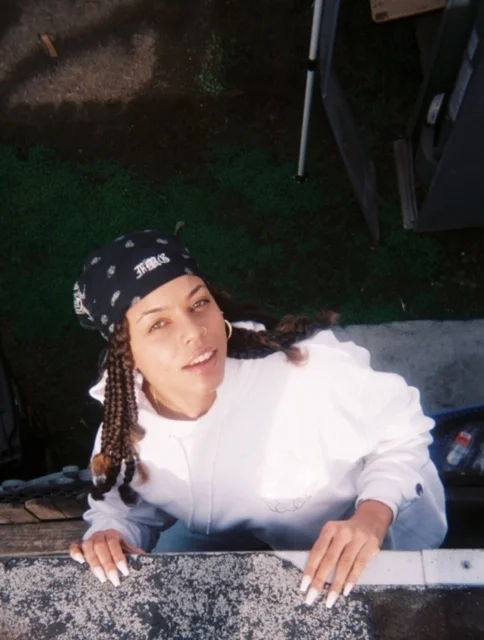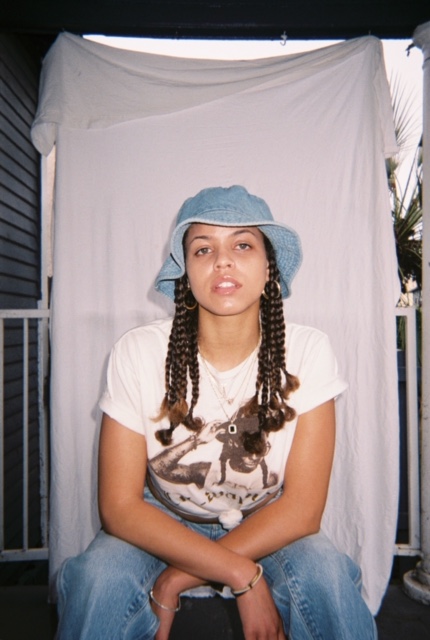As a female DJ, I find myself in an internal battle daily. I am a woman who stands for other women, who is respected by her very own demand, yet every night when I book a party I play 100+ songs that shit on everything I am and everything I do on a daily basis--and I sing all the lyrics and bob my head to every beat. I’m certain there are people who would call me hypocritical in a sense. While I don’t blame them, I speak for myself when I say that through understanding the positive and negative impact of hip-hop culture I’ve somehow made space to accept the fact that since I was a kid, the good, bad, and ugly of hip-hop culture has been a part of who I am. I’ve learned how to exist and assert myself in a space that sometimes forgets to love me while remaining aware to never compromise my personal values as a woman of color. Ava DuVernay once tweeted, “To be a woman who loves hip-hop at times is to be in love with your abuser. Because music was and is that. And yet the culture is ours.” At the core of my identity as a Black woman, I’ve subconsciously learned to shield myself from internalizing the ever-present misogyny that is cemented in the music I listen to and play for others. While there has been a call to action for men to mind their behaviors as a positive yield of feminism, it is naive to think that the music itself will change soon, if ever. As long as things are slow to change, I will move about my environment with a kind of discernment I hope to share with other women facing the same internal conflict.
“When in Rome do as the Romans,” they say. Today, as it refers to language we would call what the romans do “code-switching.” By definition, code-switching is "to alternate between two or more languages, or varieties of language in conversation." Until now, it never occurred to me that I also tend to code-switch in certain situations. Recently, I interviewed a rapper friend and as I played back the recording I noticed that I said the words “nigga” and “bitch” so much, it made me cringe listening to myself. Why was I doing this? Is this how I speak in professional environments on a daily basis? Do I talk to other women like this? On the 1996 track “Zealots” by The Fugees, living icon Lauryn Hill said, “& even after all my logic and my theory, I add a ‘motherfucker’ so you ignant niggas hear me…” After serious reflection and assistance from Ms. Hill, I came to the conclusion that this subconscious code-switching was a result of fear of not being heard unless I speak in a way that my male peers will understand. However, within that same recorded interview, there were moments where I spoke softly to challenge a comment or make a point. Contrary to my projections, my softness was validated just the same. It might’ve been the inherent respect of the men I was interacting with, or simply the fact that.. wait for it… it doesn’t matter! Looking back on other interactions where I was the only woman in the room, most of the time what mattered is what I brought to the table. I never had to be loud or crass in my delivery. Male dominated spaces can be intimidating for some of us. As a result we have to be mindful of when we are outwardly projecting the fear of being overlooked while fighting to make a point. We don’t have to fight. We don’t have to adapt the way we speak to fit the vibe of the room. Instead of expecting to not be heard, expect that the right person in the room will hear you in whatever delivery is authentic to your character.
Within my code switching epiphany the question of how I converse with other women presented itself as a recurring concern. Repurposed slang and cultural euphemisms say a lot about how our generation has reinterpreted old meanings, thus redirecting the energy behind certain words and phrases. When I was in high school, the most offensive word another girl could call you was “bitch”. These days, “bitch” has went from a fighting word to an endearing and friendly word. For example, “that’s a bad bitch” - code for calling a woman attractive or “Okaaay bitch!” - a form of praise. Context and voice inflection tell us which way the word was meant. More often than not, “bitch” is no longer considered offensive and derogatory. Being raised in Los Angeles, I have observed that some women even find it attractive and acceptable for their boyfriend to say “that’s my bitch” or “you’re my bitch,” in reference to them. The men and women who have adopted these phrases as terms of endearment would defend their choice by claiming they mean it with respect. But does giving new meaning to an otherwise degrading word or phrase make it right? People have argued that using the word “bitch” among friends and romantic partners only further degrades us and leaves room for men to continue to disrespect women in music and in life. However, I’d ask them what’s the difference between that and “nigga”? While some argue against the use of the word “nigga” as they would “bitch,” the double standard applies here. A woman who favors Lil Kim may argue for “My Bitch” instead of “My Queen.” While a woman who prefers MC Lyte may argue for “My King” instead of “My Nigga”. Both subjects are powerful, neither can be absolutely wrong.
Speaking of my niggas, I never want any of my personal views on empowering women to be misunderstood for bashing black men. While I aim to help myself and other women understand how to navigate through masculine industries, it would be remiss of me to neglect the issues that exist within these spaces. As previously stated by Ava DuVernay, the music itself is the love and the abuser. We listen to it, we rap it and some of us internalize it to the point where we begin to think it is okay to be treated the way we are discussed in songs. However, in my opinion, no matter how much we stan for rap music, the physical manifestation of this kind of rhetoric will always be unacceptable. I draw the line when the language manifests as a harsh reality of physical and verbal abuse. From multiple open dialogues with rappers and musicians, I’ve learned that the lyrics that are degrading to women are often times just an expression. As a creative, empathizing with the beauty of ruthless and raw language has helped broaden my perspective. This understanding is the reason why I play all of the ‘bangers’ during my sets, rap trap songs with conviction, and chalk up the demoralizing vocabulary to artistic expression, but I hope that when the time comes to draw the line, a limit exists that will urge men to defend us. The moment I feel unprotected will be the moment I stop defending your art.
In retrospect, my sole purpose through this dialogue was to shed light on the fact that there is room for my girls to thrive in “a man’s world”. So for the soft speaking homegirls, the loud homegirls, and all the homegirls in between, feel free to be exactly who you are when making yourself heard. When the hyper-masculine asshole in the boardroom tries to come for you, don’t hesitate to put your foot on his neck. As for me, I’ll be doing my best to leave any extra “niggas” and “bitches” off the record from now on.
- Nameless
*Originally published on Formygirls.co *
For more photos by Cydnei Jordan for For My Girls visit the Gallery tab

